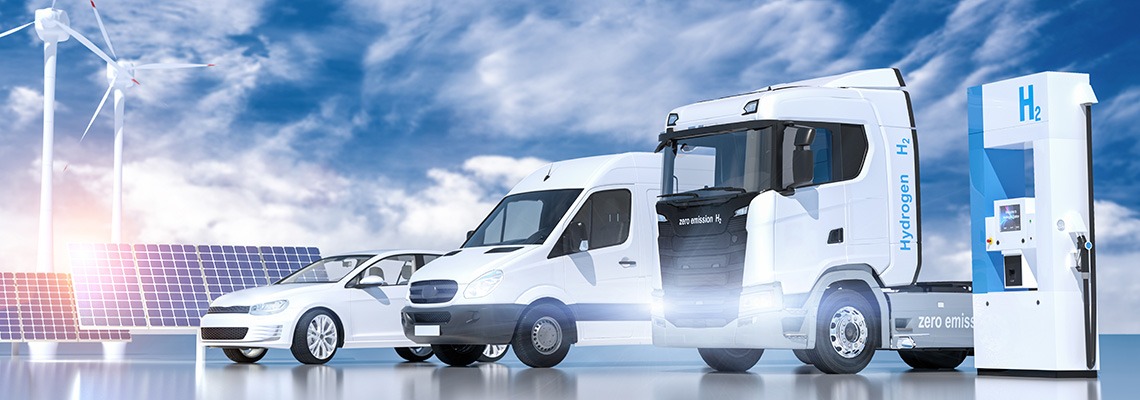Alternative Power Report, November 2022
Read news and analysis from PSR’s Guy Youngs about hydrogen power applications in the November issue of the Alternative Power report by Power Systems Research.

2022-12-02
Read news and analysis from PSR’s Guy Youngs about hydrogen power applications in the November issue of the Alternative Power report by Power Systems Research.
2022-11-16

JCB has unveiled a mobile hydrogen refueler which it says will allow on-site refueling of hydrogen powered machines in the same way that fuel bowsers are used for diesel powered equipment.
The mobile hydrogen refueller is designed to provide an easy way to refuel machines, the vast majority of which have fuel delivered to them while working on site, said the company. JCB said customers are already used to a transportable fuel system.
A new hydrogen fuel truck is being tested by the mining industry in hopes of helping to decarbonize activities that have been exceptionally challenging to mitigate. The mining industry contributes 7% of the world’s total carbon emissions per year, (according to McKinsey). This represents more than twice the carbon emissions from the global shipping industry, for example.
The hydrogen-powered vehicle is meant to replace typical mining haul vehicles, which pollute heavily.
iVT was a major winner at Bauma in Munich when it was recognized in the hotly contested Climate Protection category in the Bauma Innovation Awards. The hydrogen-combustion machine is the first ever Liebherr hydraulic excavator to be powered by a hydrogen engine
The machine’s prime power source is the H966 hydrogen combustion engine, which has six cylinders and uses port fuel injection (PFI), which Liebherr employs along with direct injection (DI) for its hydrogen engines
2022-11-15

During the past few years there has been plenty of talk about battery electric power replacing diesel-powered internal combustion engines in commercial trucks. At some point this might be true for short and regional haul freight carriers, but what about the long-haul heavy truck segment?
Currently, the lack of a sufficient charging infrastructure, range anxiety and the extreme weights associated with the batteries are significant deterrents to mass adoption of long-haul battery electric trucks. However, hydrogen fuel cell trucks for long-haul applications appear to be a viable option in this segment. Even though fuel cell trucks currently have a greater range and lighter weight than battery electric trucks, they have the same problem as electric trucks: a lack of refueling infrastructure.
2022-11-02
In the October issue of PSR’s Alternative Power Report, read about Ideanomics’ new quick charger, a new super fast rechargeable battery and a cost analysis of diesel vs. hydrogen power.
2022-10-21
As companies seek to decarbonize their truck fleets, Ryze Hydrogen says that hydrogen combustion engines are the way to go– they are cleaner than diesel and they also make more economic sense, according to the company. Many companies today are looking at fuel cells in order to be able to use H2 as a clean fuel, but there is a growing movement toward the use of hydrogen combustion engines.
Cummins and Westpoint are cited as examples, with Cummins having unveiled a medium-duty concept truck using an H2-fueled internal combustion engine (ICE), which drew substantial attention in Germany at the IAA Transportation exhibition. Similarly, Westport Fuel Systems also unveiled its own HPDI hydrogen ICE engine for heavy duty vehicles earlier in September
Hydrogen fuel cells are still a bit mysterious and likely are unattainable in the near future, but you can actually buy them right now, whether in vehicles or as parts. To demonstrate how practical they are, Alfonso Delgado Ollero built a miniature hydrogen fuel cell to power an RC truck.
The practical concerns of producing the hydrogen in the first place and the energy density being relatively low are relevant when talking about the future of the automotive industry, but according to Alfonso Delgado Ollero, they shouldn’t prevent makers from experimenting with hydrogen fuel cells.
2022-10-02
The September 2022 issue of the Alternative Power Report from PSR discusses Cummins new energy storage system, battery electric forecasts and EV shipping applications. PSR
2022-08-20
Hyundai Doosan Infracore announced that it has been selected as the lead company for the national project “Development of Hydrogen Engine System and Storage and Supply System for Construction Machinery and Commercial Vehicles” by the Industrial Technology Evaluation and Management Agency.
Through this project, the company plans to develop a 300kW, 11-liter class hydrogen engine and hydrogen tank system with zero carbon emissions, which will be installed in commercial vehicles such as trucks and large buses, and construction equipment such as excavators by 2024. After verification, the company aims to begin full-scale mass production in 2025.
“Although hydrogen engines have high energy density, they are expensive and require technological maturity to ensure durability under adverse operating conditions,” said a company official. “For this reason, the engine system is more suitable for construction machinery and medium- to large-sized commercial vehicles than for passenger cars.”
Source: Wow! Korea
PSR Analysis: Hydrogen products in Korea are still far from practical at this point. Hydrogen can be classified as green, blue, or gray depending on the cleanliness of the production process, and the hydrogen fuel cell power plant in Korea that began operating in June emits 10 tons of carbon for every ton of hydrogen it produces. At this point, Korea’s hydrogen industry is still in the gray stage, but I do not think it is time to discuss whether the technology is good or bad, as it will take time for the technology to become more advanced.
The idea that hydrogen is better suited for medium- and heavy-duty commercial vehicles than for passenger cars makes a lot of sense. However, mass production of a commercial model by 2024 is certainly a very high goal. With the lithium-ion battery industry currently thriving in South Korea, I will keep a close eye on the future development of hydrogen in the country. PSR